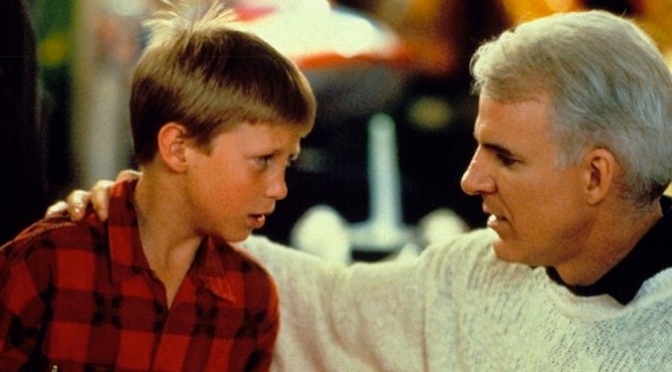Parenthood might be the first time Ron Howard really showed his talent as a director. Grand Theft Auto and Night Shift were passable as Howard found his directorial voice, and Gung Ho and Willow were larger productions that achieved different levels of success as Howard matured. I’d entertain an argument for Cocoon as the first glimpse of the great director Howard would one day become, mostly for the subtle mix of fantasy, sentimentality, humor and drama. But Parenthood, although admittedly very different, is the better film. With a burgeoning cast that can only be described as an ensemble, Howard’s brilliance lies in making that ensemble feel more like — oh no, he’s going to say it — a family.
There are the young ones — Kevin, Taylor, Justin, Patty, “Cool” and Garry (a pipsqueak Joaquin Phoenix) — each content in their kid ways to run around with head-in-bucket (in Justin’s case) or figure out the square root of 8,649 (in Patty’s case [it’s 93]). There’s Garry’s older sister Julie and her boyfriend/husband Tod. There’s the next generation, the brunt of the Buckman clan led by Steve Martin’s Gil, and the spouses of each Buckman sibling. And then there’s the patriarchal generation, with Grandpa Frank played by the great Jason Robards, utterer of the greatest line in cinema history (from Once Upon a Time in the West — either ya knowhadimean or ya don’t).
The fact that each of these characters is wholly memorable is only half the battle. We’ve discussed great ensembles like The Flight of the Phoenix (original, not remake) and touched on the differences between those and other ensemble films like Crash or Love, Actually. While the latter group makes for an entertaining night at the movies, the ensemble is managed over a framework that’s not dissimilar from a game of Six Degrees of Separation — which is to say that the numerous characters are connected by theme, by the occasional run-in, by us as we watch their disparate threads unwind. The flip side is in ensemble movies like Traffic or Murder on the Orient Express, where the connection between the characters is in the shared experience. Sometimes this works wonderfully and we get Flight of the Phoenix, and sometimes it’s a bit of a mess and we get Avengers: Age of Ultron.
Parenthood is a hybrid. The extended Buckman Family shares a wealth of experience: they all roll their eyes at the homecoming of prodigal son Larry (played by Tom Hulce, who nails his scenes with Robards); they all sit around the table at the holidays; and they all attend Kevin’s ninth birthday party and witness the birth of Cowboy Gil (more on that in a second). So this ensembles shares plenty of experience. They’re connected by thematic elements, too, all having to do with parenthood and the joy of bringing new life into the world, and that serves to strengthen the connection between these characters when they do get together for supper. Parenthood boasts a pretty dynamic cast, but everyone seems to stick their head out from the thick of it. Better still, everyone is someone unique.
So the managing of that ensemble is Howard’s great achievement on Parenthood. He’d repeat the trick time and again as his career continued, and again, even though Cocoon is a neat little film, Parenthood is the jumping-off point for that. Ensemble filmmaking aside, the second reason Parenthood works so well is in the casting of Steve Martin as Gil Buckman. Gil’s neurotic, he’s cynical, he’s funny — Martin fits that perfectly. But Gil’s also serious about his life, which is a hell of a lot more than one could say about most other Steve Martin characters, and yet the actor shines brightest in the scenes that play like dramatic material. The look he gives when son Kevin loses his retainer is one of shock, of blank realization, of fear. It’s surrounded by comedy, including an ensuing scene of Martin rooting for the trash to find the retainer — but the scene itself shows how well Martin handles dramatic material, and that single look tells us a lot more about Gil than the comedic scenes.
That, too, is a hybrid. The comedy in Gil tells us a lot about his character also. Cowboy Gil shows up at his son’s birthday party when Cowboy Dan fails to show up, and Martin is his unhinged usual self (“After I blow a hole and somebody had slip around on their guts, I like to make balloon animals”). Two scenes later he’s having a fight with his wife in their bedroom about whether or not to have a fourth child, about everything they’ve done as parents so far, about everything they have to do (“My whole life is have to“). This is the dramatic Martin, the Spanish Prisoner Martin, and his presence deepens the larger character study of Parenthood.
From Parenthood onwards, Ron Howard’s filmography would oscillate between comedy and drama and touch a few points on the spectrum in between. Even if it’s not as funny as EdTV or as “serious” as Apollo 13, the most likable thing about Parenthood might be that it never even tries. The mix of ensemble filmmaking styles and the mix of comedy and drama always plays under the actual story, which is a testament to why it’s still a viable story of family life fifteen years on. It’s also a testament to Howard’s focus and natural inclination toward the story of a film, not the “directing”, with Parenthood standing as his first truly great film.

